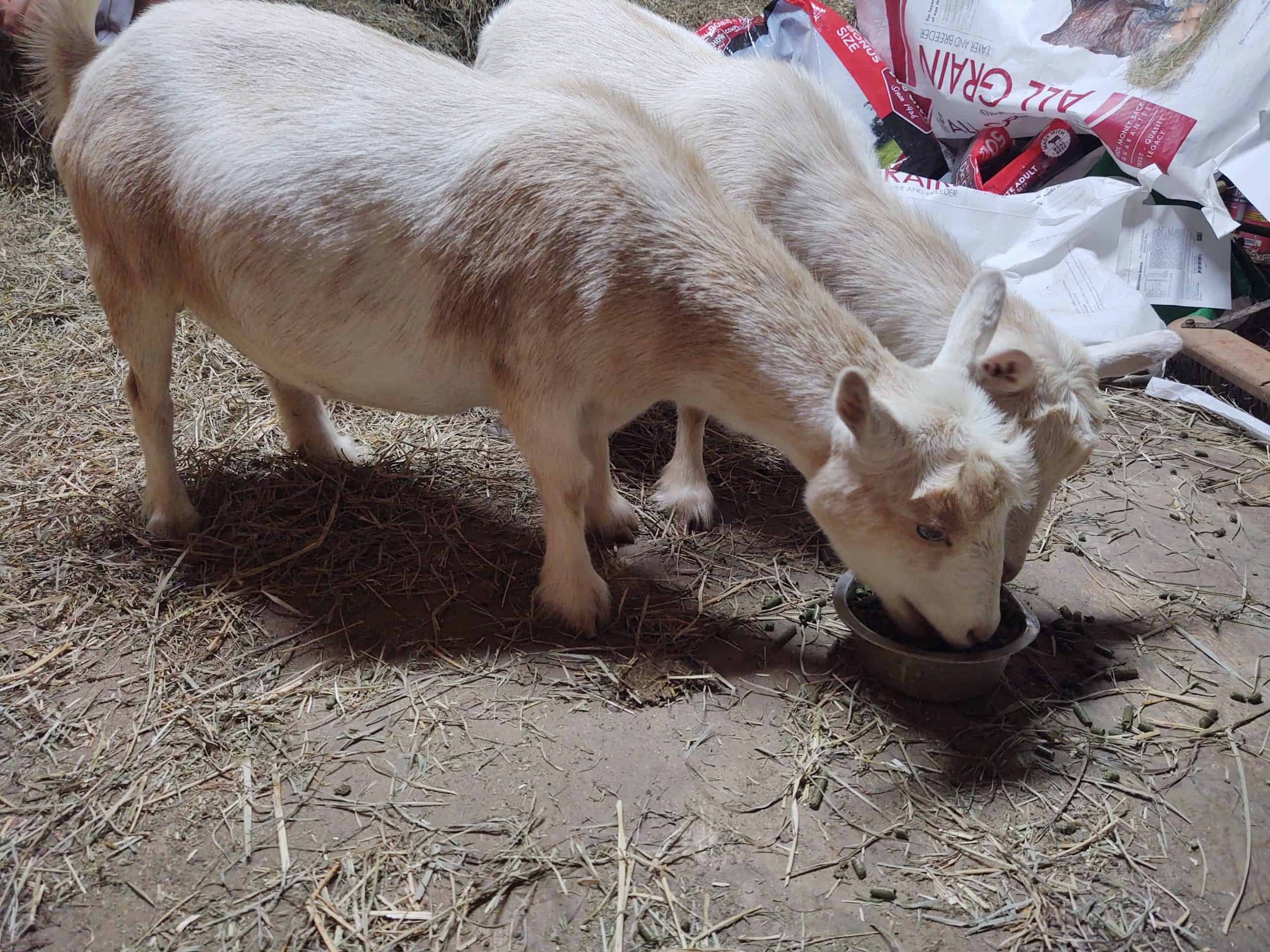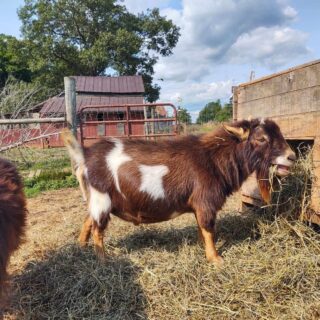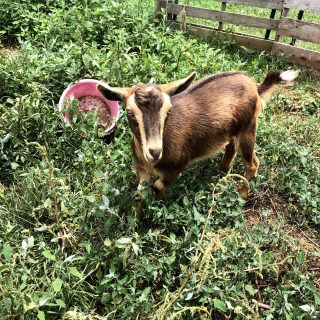Blueberries are healthy fruit snacks, and if you are eating them, you may wonder about sharing a few with your goat. Goats love to eat all kinds of treats even ones that aren't good for them. So, can goats eat blueberries?
.It's important to know which foods you can safely feed your goat and which ones you should avoid. Keep reading to find out just how safe are blueberries for your goat to eat, and will they end up making them sick?

Can Goats Eat Blueberries
Yes, goats can eat blueberries and, in fact, love them. Blueberries are a healthy treat full of antioxidants and a variety of vitamins such as Vitamin C, Vitamin K and Potassium. Fruits like blueberries have a lot of sugar, so ensure they don't overeat them.
Just like other treats goat should never eat more than 20% of its diet in blueberries. And you need to be cautious that they don't get too much sugar. Just like when feeding goats watermelon, feeding goats oranges and feeding goats pineapple.
Can Goats Eat Blueberry Plants or Bushes?
Yes, goats can eat blueberry plants or bushes. Unlike some other plants in the fruit family like tomatoes, blueberry plants are safe to eat.
One year, our herd got into our berry patch and quickly plucked EVERY SINGLE berry off the bushes and then also promptly chopped the bushes themselves down.
If your goat happens to break into your blueberry patch, then you don’t need to worry too much as there isn’t anything that is going to poison your goat. The biggest worry you should have is if you sprayed pesticides on the plant, as you don’t want those toxins making their way into your goat's body.
The plant part of the blueberry probably won’t be your goat's favorite part, and they will be more interested in consuming the fruit itself.
Can Goats Eat Blueberry Leaves?
Yes, goats can safely eat the leaves of a blueberry plant without worry. Like with the plant itself, though, you need to be cautious if you have used pesticides on your plants.
Make sure to wash any leaves off thoroughly before giving them to your goat. Like with the plant itself, your goats will likely prefer the fruit over chowing down on the leaves.
If you do use pesticides, make sure to use fencing to ensure that your goat doesn’t get into your plants. This can save you a trip to the vet if things take a turn for the worse after your goat treats itself to a plant buffet.
Need some help to keep your goats healthy and maintained? The G.O.A.T Herd Management Binder has you covered from supplies to routine care reminders.
How to Feed Your Goats Blueberries
Blueberries will need to be thoroughly washed off before you give them to your goat. This is due to the fact that most plants you buy in the grocery store have had pesticides used on them.
Pesticides are toxic to goats, so you will want to avoid allowing them to ingest these chemicals at all costs. You will also want to be careful of what type of blueberries you are feeding to your goats.
Canned blueberries, as well as frozen ones, will likely contain extra ingredients like salt or preservatives that can further upset your goat’s stomach. In addition, there are tons of blueberry fillings that are made for making sweets like pies. These are not suitable for goat consumption and often contain chemicals that can lead you to visiting the vet.
If it’s made to be a sweet snack, then you shouldn’t give it to your goat. Goats aren’t able to identify which foods they should and shouldn’t eat. If you put something in front of them that looks tasty, they will eat it regardless of the eventual outcome.
This also extends to blueberry-filled products like pastries and items like muffins that contain blueberries. These also contain other ingredients that won’t agree with your goat's body.
A blueberry pop-tart is extremely high in sugar, for example, and even humans shouldn’t be eating a large quantity of them or even trying to consume them every single day.
Watch out for any signs of an upset stomach and your goat getting diarrhea when you are feeding them berries. This is a good sign that they are eating too many or that the amount of sugar they are intaking is too much for their body to handle.
If you see either of these signs, make sure to dial back how many blueberries you are giving them and give them some time to let their tummy calm down before trying to feed them treats again. Generally, this isn’t a huge sign for concern. Just provide your goat with plenty of water to keep them hydrated and give them time to recover.
Luckily, Blueberries tend to be a small food, so you don’t need to worry about cutting them up unless you want to. This does help to get your goat to consume the blueberries slower and will make them think they are getting more treats than they actually are.
You should never surpass 20% of your goat’s diet in treats. If you feed them more and continue to do so each day, then they will have a nutrition deficiency which will eventually cause you to need to call a vet and most likely cut out treats altogether for quite some time. You also need to be cautious of blueberries and other high sugar fruits in particular.
In addition, blueberries have antioxidants. These help to stop free radicals from having reign in your goat's bodies. In fact, blueberries are well known for the fact that they contain antioxidants, and it’s one of the reasons why they are always presented as a healthy fruit choice.
Keep in mind that several other treats like broccoli and spinach also contain antioxidants and can be a great treat.
Blueberries do contain a high amount of nutrients that can be beneficial to your goat when fed in proper portions. For starters, blueberries do contain fiber, which is a natural part of your goat's normal diet.
Blueberries contain Vitamin C, which helps to boost the immune system, and Vitamin K, which helps your goat's body to make proteins needed for causing blood clots. Potassium is also included in blueberries which is needed to help keep tissues in your goat's body healthy.
Blueberries are also extremely low in fat, which means you don’t need to worry about having an overweight goat.
As with any new food that you are feeding your goat, you should be cautious. When you first give your goat any new treat, only give them a small portion and keep a close watch on them for any signs of sickness.
Once some time has passed without any type of negative reaction, you can begin to feed your goat more blueberries without worry. Also, keep in mind that blueberries should not be given to a goat below six weeks of age, as their diet is extremely limited.
FAQ
What fruits can goats eat?
Goats can eat a large variety of fruits like oranges, apples, bananas, and peaches and pineapples. Before feeding your goat any new treat, make sure to double-check with your vet and do your own research to ensure that they can eat it.
Some healthy food items like potatoes can be deadly when given to your goat before they are ripe and when they are still raw. Prior research is the best way to ensure that your goat is healthy.
If you need more help keeping your goats healthy and well taken care of, check out the G.O.A.T. Herd Management System - worksheets, calculators, supply management and more to keep your goats in tip top shape while cutting down on time.




